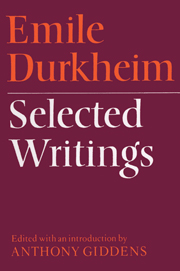Book contents
- Frontmatter
- Contents
- Preface
- Abbreviations
- Introduction: Durkheim's writings in sociology and social philosophy
- 1 The field of sociology
- 2 Methods of explanation and analysis
- 3 The science of morality
- 4 Moral obligation, duty and freedom
- 5 Forms of social solidarity
- 6 The division of labour and social differentiation
- 7 Analysis of socialist doctrines
- 8 Anomie and the moral structure of industry
- 9 Political sociology
- 10 The social bases of education
- 11 Religion and ritual
- 12 Secularisation and rationality
- 13 Sociology of knowledge
- Index
4 - Moral obligation, duty and freedom
Published online by Cambridge University Press: 05 August 2012
- Frontmatter
- Contents
- Preface
- Abbreviations
- Introduction: Durkheim's writings in sociology and social philosophy
- 1 The field of sociology
- 2 Methods of explanation and analysis
- 3 The science of morality
- 4 Moral obligation, duty and freedom
- 5 Forms of social solidarity
- 6 The division of labour and social differentiation
- 7 Analysis of socialist doctrines
- 8 Anomie and the moral structure of industry
- 9 Political sociology
- 10 The social bases of education
- 11 Religion and ritual
- 12 Secularisation and rationality
- 13 Sociology of knowledge
- Index
Summary
REASON, ART AND MORAL OBLIGATION
Let us suppose that [a science of moral facts] has been perfected. Our ascendancy is culminated: we are masters of the moral order. It is no longer external to us, since from this point on we conceive of it in terms of a system of clear and distinct ideas whose relationships we understand. Now we are in a position to ascertain the extent to which the moral order is founded in the nature of things – that is, in the nature of society – which is to say to what extent it is what it ought to be. In the degree that we see it as such, we can freely consent to it. For to wish that it be other than is implied by the natural make-up of the reality that it expresses would be to talk nonsense under the pretext of free will. We can also see to what extent it is not based on the order of things, for it is always possible that it may involve abnormal elements. But then we should have available, thanks to the same science we are supposing to be established, the means of restoring it to a normal state. Thus, on condition of having adequate knowledge of moral precepts, of their causes and of their functions, we are in a position to conform to them, but consciously and knowing why. Conformity which has thus been assented to is no longer a constraint.
- Type
- Chapter
- Information
- Emile Durkheim: Selected Writings , pp. 108 - 122Publisher: Cambridge University PressPrint publication year: 1972
- 1
- Cited by



